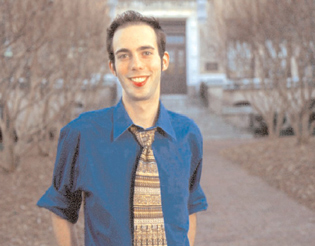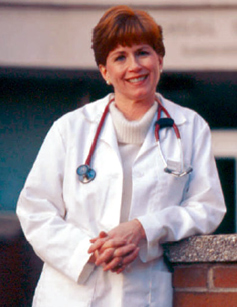

A publication of The Graduate School, University of North Carolina at Chapel Hill
On-Line Version Spring 2004
Home | Back issues | About us | The Graduate School | UNC-Chapel Hill | Make a gift
HEALTH CARE UNDER THE MICROSCOPE
Should the government provide health care coverage for every citizen, regardless of cost?
Should Americans be able to buy medicine from Canada at cheaper rates but without U.S. quality controls?
Do developed countries have an obligation to help developing nations obtain expensive but life-saving drugs?
 |
| Photos by Will Owens |
| Philosophy student Andrew Courtwright found the catalyst for his dissertation on health care systems through the Health Care Ethics Seminar. |
 |
| Public Health student Erin Taylor wants to influence health care policies and decisions one day. Her work with the Health Care Ethics Seminar has helped her understand different issues that need to be considered when designing ethical health care systems. |
 |
| Psychology student Jameeliyah Lane makes a point to the group during a meeting on the ethical considerations of biobanks. |
These might be tough questions, but 11 students at UNC-Chapel Hill grapple with them on a regular basis. Every other Tuesday the debate rages in Carrington Hall as the Health Care Ethics Seminar meets to discuss the hot topics in health care: Questions about government-provided health insurance, the price of prescription drugs, care for terminally ill patients and the genetic modification of humans get volleyed back and forth across the long seminar table in room 104.
Each student brings something different to the table. For example, Cathy Nakayama brings her years of nursing experience and research on living wills. Erin Taylor brings knowledge of economics and insight into how poverty can limit access to medical care. Andrew Courtwright brings a mixture of expertise in biology and philosophy. Ingra Schellenberg brings a compassion for patients stemming from her experience as a hospital ethicist.
Introducing interdisciplinary learning
As members of The Graduate School’s Scholars for Tomorrow Health Care Ethics Seminar, the students are learning from one another’s ideas and opinions and contributing to national and international debate on health care issues. This interdisciplinary approach is the key to the Scholars for Tomorrow Fellowship Program, which pulls students from many different disciplines together to discuss questions revolving around a central theme. Graduate faculty nominate students to the groups, which also have included aesthetics in society, computational sciences and global studies. Students receive one graduate credit and a small stipend for their participation.
Most importantly, the fellows are introduced to interdisciplinary learning, which many scholars believe is the key to a successful graduate education. Faculty leaders encourage the students to broaden their horizons through guest speakers, group discussions, community projects and research-related field trips. These invaluable interactions expose them to innovative ideas, cutting-edge technology, mutual interests and research tools.
Learning from different viewpoints
Professor Susan Pierce leads the Health Care Ethics Seminar. A professor in the School of Nursing, Pierce draws from her professional experience and her research on end-of-life care to guide the scholars in their exploration of difficult ethical questions.
Her own experience in ethical decision-making began when she was a nurse in a critical care unit, where she helped make difficult decisions about her patients’ lives. For instance, should therapy for a dying patient be continued? If so, for how long? Being faced with tough decisions and not always feeling prepared to make them prompted her to undertake a serious study of ethics, she said.
“I’m really convinced that ethics is a philosophical discussion,” Pierce said. “Though people can certainly come to a moral decision, to actually do ethics you need a background in it.”
“Otherwise, it’s too easy to become sloppy.”
With this in mind, the seminar group aims to educate tomorrow’s health care leaders about making ethical decisions. A key component of this education lies in the scholars’ eclectic backgrounds. A graduate student in philosophy, Andrew Courtwright said his undergraduate degrees in biology and philosophy led to his interest in the ethics of genetic modification and universal health care systems. Hearing the opinions of primary care providers, health policy students and economists in the group has helped him better understand the issues he thinks about daily, he said.
“There’s a strong tendency in academic disciplines like philosophy to do ‘armchair’ ethics, where you think about these issues without considering any of the feasibility concerns,” Courtwright said.
After participating in group discussions about different health care systems around the world, Courtwright plans to write his dissertation on “what a just health care system would look like.” He hopes that the model he creates will help guide the decisions of health care policy-makers.
For future policy-maker Erin Taylor, the group’s varied perspectives have informed her work in the School of Public Health’s Department of Health Policy and Administration.
Taylor first became interested in issues of health care ethics when her father lost his job and her family’s health insurance during her sophomore year at college, forcing her to become conscious of health care costs.
“It was a real eye-opener,” said Taylor. “All of a sudden, I had to pick and choose when I wanted to go to the doctor and make sure it was serious before I went.”
She began studying economics with an emphasis on health-related issues, culminating in a senior thesis in which she studied access to essential medicines in Third World countries. Hoping to someday influence health care policy decisions in Washington, Taylor is learning more about the different concerns that go into health policies from both her coursework and from the Health Care Ethics Seminar.
“It’s fascinating to hear what people from economics, psychology and philosophy think about the exact same issues that I’m talking about in class on an almost daily basis,” she said. “The conversations are eye-opening, and they give me more information that I can bring back to my program.
 |
| Photo by Will Owens |
| Cathy Nakayama struggles with difficult ethical decisions in her studies in the School of Nursing. Her research focuses on how hospitals can better fulfill patients’ end-of-life wishes. |
 |
| Photos courtesy of Michelle Schohn |
| Scholars Amos Peters and Kama Lyons listen as the group discusses. |
Fostering discussion, encouraging exchange
Group members are responsible for facilitating the group’s discussion during one of their semimonthly meetings, choosing an ethical question from their own research.
The resulting conversations are nothing if not lively. Taylor’s question for the scholars—do developed countries have the obligation to help developing countries have access to medicines?—prompted a debate so heated that it took her half an hour to get a word in edgewise.
While the scholars often disagree, their disagreement is part of what makes the seminar work: The conflict among ideas challenges assumptions and brings fresh viewpoints to light. For example, during Courtwright’s presentation on genetic modification—should humans be allowed to enhance their bodies?—one group member pointed out a flaw in Courtwright’s reasoning, which Courtwright followed up on later.
Kama Lyons, a student in Recreation and Leisure Studies, said she found the atmosphere at the Health Care Ethics Seminar meetings conducive to discussion of these hotly debated topics.
“We get together for two hours every other Tuesday, and we’re there to sort of shoot each other down,” she laughed. “We’re there to say, ‘What about this? Have you thought about it this way?’ And everybody in the group is mature enough to want to look into other ways of seeing things.”
Adding ethics to health care discussions
Many of the scholars contribute to the discussion by sharing their own experiences with difficult ethical situations.
Cathy Nakayama lost her father to cancer just two weeks before she entered the School of Nursing. Lack of communication among hospital personnel made an already painful situation worse for her family when the hospital ignored her father’s do not resuscitate order.
After this painful experience, Nakayama decided to help people better prepare for end-of-life issues. She hopes that her research with the families of patients who had advance directives before their deaths will one day result in a better system for care instructions that will ease pain for patients and their families.
“Patients and families being satisfied with the care their loved one received is very important,” she said. “If families are satisfied with end-of-life care, it might make the experience less painful because they know that their loved one’s wishes were followed.”
Ingra Schellenberg’s work as a hospital ethicist taught her that the line between a patient’s competency and incompetency is often hard to pin down. After working with patients deemed mentally incompetent, she found that doctors’ views of their patients often could be quite limited.
“I found myself really intrigued by what the patients said and how they saw the world,” she said. “I had a new appreciation for what the world might look like from the view of another person.”
“Not a lot of people were taking the time to see that.”
A doctoral candidate in philosophy, Schellenberg is now studying psychopathology, or the way mentally incompetent patients are understood by their doctors. She hopes to draw on her clinical experience and her study of ethics to forge a link between the philosophical and clinical studies of mental disorders.
“Just being immersed in the clinical setting would not result in my being a very good ethicist,” she said. “Having some of both means I do better at both.”
A broad view of health
Being healthy involves more than just good health care.
While access to medication and good hospital care are important, Lyons believes that a person’s quality of life also hinges on their ability to just have fun. A student in recreation and leisure studies, she noted that recreation has both physical and mental benefits.
“I think we usually underestimate what we’re capable of,” Lyons said. “Recreation brings people together and sort of throws them into a situation, and then allows them and compels them to succeed in a way that our jobs don’t always provide.”
But hospitals and insurance companies often are reluctant to pay for recreational therapy for patients, in part because its benefits can be difficult to prove.
“How do you measure self-confidence, or that someone just feels better after participating in the activity?” Lyons asked. “It’s not something you can really prove, but should we still be providing it to patients who need it?”
Making a difference by sharing
“I think we are helping each other come to a better understanding of health situations,” Taylor said. “By sharing our own experiences and our own opinions, maybe that will help some of us disseminate that information or idea to someone else.”
The Scholars for Tomorrow have big plans for the future: Their work in the seminar helps prepare them for a future as health care leaders by sharing information, ideas and opinions about the way health care should work. And while they come from varied backgrounds and ideologies, in the end, they are all talking about the same thing: what is best for a healthy society.
“This group has really clicked,” Pierce said of the scholars. “Several have said that this seminar is the most exciting thing they’re doing this semester, and I generally have to shoo them out the door when the class is over because they’re still sitting around talking about these issues.”
Taylor agreed. “Information sharing is incredibly important in helping to exact change in the world,” she said.
“In the end, that will help in the big picture.”
- Grace Camblos
© 2004, The Graduate School, The
University of North Carolina at Chapel Hill
All text and images are property of The Graduate School
at the University of North Carolina-Chapel Hill. Contact Sandra Hoeflich
at shoeflic@email.unc.edu
to request permission for reproduction.